

College Quarterly - Articles - Managing Disruptive Behaviour in the Classroom. College Quarterly Summer 2011 - Volume 14 Number 3 Managing Disruptive Behaviour in the Classroom By Catherine Deering, Ph.D.
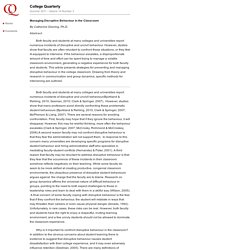
IRIS Resource Locator. Center on Enhancing Early Learning Outcomes (CEELO) The Center on Enhancing Early Learning Outcomes (CEELO) works to strengthen the capacity of state education agencies (SEAs) to lead sustained improvements in early learning opportunities and outcomes.
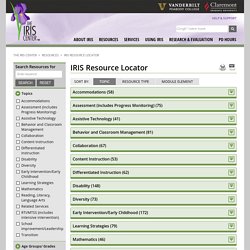
Resources on this site include publications, webinars, and presentations about EI/ECE assessment, as well as links to other centers. The CEELO Annotated Bibliography on Early Childhood Assessment highlights resources found on the Website. This center works in partnership with SEAs, state and local early childhood leaders, and other federal and national technical assistance providers to promote innovation and accountability.
CPD-factsheet-6. Effective Classroom Management in Higher Education. January 26 Strategies for Preventing Student Resistance By: Shannon B.
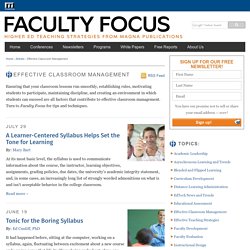
Seidel, PhD and Kimberly D. Tanner, PhD “What if the students revolt?” When teachers try something different in the classroom and students resist, the teacher may back down. Classroom Management. Know your philosophy regarding education and tell your students what it is.
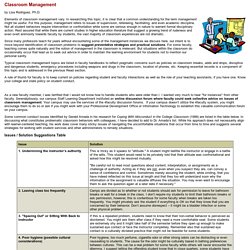
This can be an enlightening experience for them to realize that you consider your career to be deeper in meaning beyond merely collecting a paycheck. Take digital photos (with permission) of the class to let them know that you value them and want know their names and faces as soon as possible. Advice for the First Day of Class: Today We Will. The first day of class is critical.

What happens on the first day, even in the first moments, sets the tone for the entire course. The impression you make will last the entire semester, and today’s students are not shy about sharing their opinions. Most students will make up their minds about the course and the instructor during that first class period. That is why you must use the first day, the first moments of class, to inspire confidence in your abilities and create a classroom atmosphere where the rules are clear; expectations are high; and yet students feel welcome, comfortable, and engaged. Remember that your classroom will develop its own distinct environment and culture. Tips for Handling Students Excuses. As new teachers very quickly learn, students will come up with all kinds of excuses for missing assignments and other work.
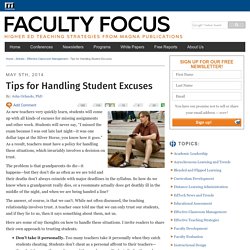
Students will never say, “I missed the exam because I was out late last night—it was one dollar taps at the Silver Horse, you know how it goes.” As a result, teachers must have a policy for handling these situations, which invariably involves a decision on trust. The problem is that grandparents do die—it happens—but they don’t die as often as we are told and their deaths don’t always coincide with major deadlines in the syllabus.
So how do we know when a grandparent really dies, or a roommate actually does get deathly ill in the middle of the night, and when we are being handed a line? The answer, of course, is that we can’t. Here are some of my thoughts on how to handle these situations. Don’t take it personally. As always, I welcome your comments, criticisms, and cries of outrage. Dr. Strategies for Preventing Student Resistance. Editor’s note: The following is an excerpt from “What if students revolt?”
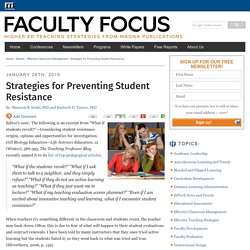
—Considering student resistance: origins, options and opportunities for investigation. Cell Biology Education—Life Sciences Education, 12 (Winter), 586-595. The Teaching Professor Blog recently named it to its list of top pedagogical articles. Seasoned educators weigh in on not losing control of a class. It might be every professor’s worst nightmare: losing control of a class with no hope of getting it back on track.
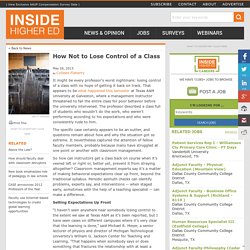
That appears to be what happened this semester at Texas A&M University at Galveston, where a management instructor threatened to fail the entire class for poor behavior before the university intervened. The professor described a class full of students who wouldn't do the work, who weren't performing according to his expectations and who were consistently rude to him. The specific case certainly appears to be an outlier, and questions remain about how and why the situation got so extreme. It nevertheless captured the attention of fellow faculty members, probably because many have struggled at one point or another with classroom management. Civility/Incivility in the College Classroom. Introduction Incivility is any kind of disruptive classroom behavior that shows disrespect or disregard for the instructor and fellow-students.
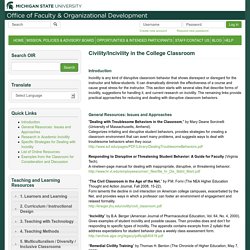
It can dramatically diminish the effectiveness of a course and cause great stress for the instructor. This section starts with several sites that describe forms of incivility, suggestions for handling it, and current research on incivility. The remaining links provide practical approaches for reducing and dealing with disruptive classroom behaviors. General Resources: Issues and Approaches "Dealing with Troublesome Behaviors in the Classroom," by Mary Deane Sorcinelli (University of Massachusetts, Amherst). Categorizes irritating and disruptive student behaviors, provides strategies for creating a classroom environment that can avert many problems, and suggests ways to deal with troublesome behaviors when they occur.
Responding to Disruptive or Threatening Student Behavior: A Guide for Faculty (Virginia Tech). “Incivility” by B.A. Web.calstatela.